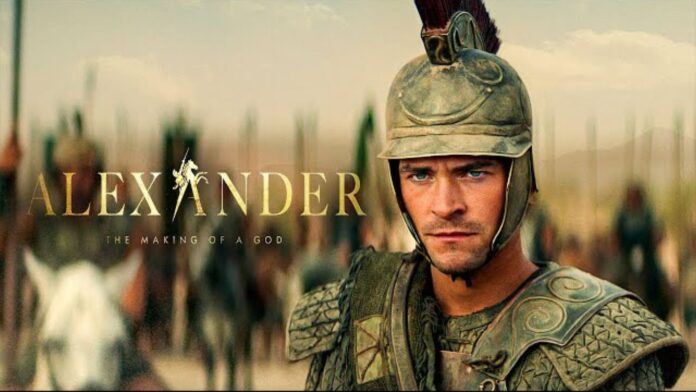Alexander the Great is generally conceded as one of the most brilliant and effective military commanders and conquerors of all time. By the time of his death at 32 in the 4th century BCE, he had amassed the largest empire that had ever been seen up to that point in history — the ruler of half the world’s population. He is also highly regarded by LGBTQ+ historians as one of the most prominent LGBTQ+ figures of antiquity.
Unsurprisingly, Alexander’s status as an LGBTQ+ person has long been a matter of some debate in historical and academic circles. Traditionalists claim that the relationship between Alexander and lifelong companion Hephaestion was only one of friendship. However, most modern historians say that their relationship was akin to the epic Homeric couple, Achilles and Patroclus, of Trojan War fame.
The pro-LGBTQ+ folks at Netflix have unveiled their take on the Alexander/Hephaestion matter with their new docudrama series “Alexander: The Making of a God.” In this six-episode mix of historical recreation and academic talking heads, the historians come out and say it at the beginning of the first episode: “Hephaestion was the great love of Alexander’s life.”
The series covers that span of Alexander’s life from his initial rise to power through his successful conquest of the vast Persian empire, the most powerful realm in the world at that time.
Alexander was the son of Philip II, king of Macedon, a smallish kingdom in the northern reaches of what is now modern Greece. After the assassination of his father, Alexander ascended to the Macedonian throne at the tender age of 20. After brutally consolidating his power, he embarks on a campaign against Persia, which Macedon and other Greek kingdoms have been battling for years. By the end of the series, not only has Alexander been crowned king of Persia, but also pharaoh of Egypt and declared the son of Zeus (or Amon-Ra, as Zeus was called in Egypt).
This being a Netflix show, clearly a lot of money was spent on the dramatic recreation segments. The production values were usually high, almost cinematic at some points (the battle scenes were often particularly impressive). The story moved along briskly; the arduous years of the campaign passed at a good clip. Additionally, the talking heads of the historians that popped up periodically were neither intrusive nor academically dry. In fact, they helped the story move forward, providing important details that fleshed out the narrative, giving important historical context to the motivations of the major players. Actually, the talking heads were all rather lively speakers.
The story focuses, of course, on the two kings: Alexander and Darius. The recreation opens on Alexander at the end of his exile from his father’s court, as he trains and romantically frolics in a river with Hephaestion. This is notable in its newness and openness. In previous dramatic portrayals, little or no attention is ever given to the romantic side of the relationship. So, even though the scenes are relatively brief, it’s refreshing to see the two of them, not at war or in battle, simply in love and devoted to each other — and fully accepted by their compatriots and culture.
In all honesty, though, the actors portraying the lovers are not much better than adequate. Buck Braithwaite plays Alexander with great conviction, but lacks the almost divine charisma one would expect from such a towering historical figure. Will Stevens does somewhat better as Hephaestion, conveying devotion to the man he loves, and loyalty to the king he serves.
Admittedly, the series has a few shortcomings and the recreation deviates a little from historical accuracy, but by and large, it does justice to the historical Alexander, and his lasting relationship with Hephaestion. “Alexander: The Making of a God” is an entertaining chance to learn about an important piece of our LGBTQ+ history.
